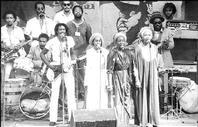
Rita Marley (centre), widow of the late superstar Bob Marley, teams up with the other members of 'I Threes', Judy Mowatt (left) and Marcia Griffiths, to sing two of Bob Marley's songs at the Arena on May 11, 1981.Toussaint Smith, Staff Reporter
The Gleaner has had its fingers on the pulse of the entertainment scene for decades. Naturally, our picture archives contain many a 1000-word story about those who have given us happy, memorable moments. In our series 'From the Archives', we pluck a pic and take a peek into the past, speaking to the central figure about the moment and subsequent events.
Sunday Gleaner: Tell me about the concert.
Judy Mowatt: This is not a concert. It's one of the saddest days of our lives. It's Bob Marley's thanksgiving celebration at the National Arena, May 11, 1981. We are saying goodbye to a brother, friend, husband, father, the Honourable Robert Nesta Marley, affectionately called 'Brother Bob'.
SG: What was it like being a part of the I Threes?
JM: We were not just
co-workers. Apart from our working relationship, we had a sacred bond that went deep. We were truly sisters and that reflected in the music. Our harmonies went beyond the stage and the studios; it originated in our spirits. For example, we would approach a song with the same attitude and style, without having to consult each other and the same went for our dance movements. If one experienced pain, we all would.
SG: What's your most memorable moment with the I Threes?
JM: There are so many, but there is one that will always stand out in my mind. It is the Zimbabwe Independence celebration. The first concert was in the morning and only world leaders and dignitaries were invited. I remember Prince Charles and his battalion of soldiers were there; I had never seen so many soldiers in one place. We were in the middle of, I think, the fourth song, when we saw people falling, especially children. There was a burning sensation in my throat and I was fighting to breathe. I looked at Rita and Marcia and they were experiencing the same feeling. We looked at Bob, needing a signal from him, but he was in his element; his eyes were closed. We made a fast exit off stage. We ran into the back of a truck, but it got worse. Well, I thought this is where we were going to die. We begged the driver to take us to the hotel. When we got there, we watched the Union Jack dismounting the Rhodesian Flag and mounting the new Zimbabwean flag. We decided to go back to the stadium and, upon our arrival, we saw Bob and the Wailers coming off the stage. He greeted us and said, "Now I know who are the true revolutionaries." We were told that ruckus was caused when the uninvited soldiers, upon hearing Bob's music from miles away, stormed the gates and the soldiers on duty had to fire tear gas to scare them off.
SG: How has your life changed since?
JM: I am a born-again believer. I look the same, but I have a brand new nature, a brand new desire, hence a new song which says that 'Jesus Christ is the Lord of my life'.
SG: How is your spiritual growth so far?
JM: I am learning more about God's heart and mind. He is a holy God and he wants us to be holy. He will never lower the standard because, at salvation, he gave us everything that would enable us to live and walk holy. I must be honest; I have failed him at times, but I have repented and now I rely solely on his grace and mercy for restoration and I have determined in my heat to give God what he wants.
SG: Do you ever think about going back?
JM: There is nothing to return to. My worst days are behind me and my best are here. I am experiencing real peace and joy that money cannot buy. Even in the midst of trials and challenges, I am not hopeless. God has given me the confidence to trust him. He has a track record in my life of his goodness and love. I just have to call on his name, Jesus. I am more than a conqueror in him.
SG: What are you up to now?
JM: I am in the process of writing and collecting new songs for my next project.










